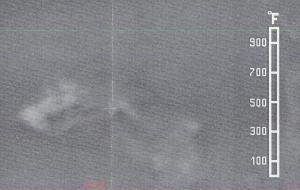November 30, 2009
 Thermal image: Gun in the snow (via Suffolk County DA).
Thermal image: Gun in the snow (via Suffolk County DA).
Jose Rodrigues, 25, last week became the first person in Massachusetts to be convicted by a jury on an illegal gun-possession charge based on technology that proved a gun he'd been holding on a cold January night still retained some of his body heat.
The Suffolk County District Attorney's office used images from a thermal-sensing device that officers pointed at the gun to prove it still retained heat on the night of Jan. 12.
The DA's office says officers tried to stop Rodriques on Whittemore Street when they spotted him clutching his waist as if he had a gun; when he ran down Glendale Street, they spotted him making a motion with his arm as if he were tossing something in a yard. The thermal imager helped tie Rodrigues to the gun they found there because the fact that it was still warm indicated somebody had been holding it not long before.
The device is not new technology - fire departments have used it for years to look for potential hidden fires and to help determine where fires started. According to the DA's office, however, Massachusetts courts had previously rejected thermal-imaging images as evidence. In 2008, though, prosecutors succeeded in having Priam Pillai, an MIT graduate student in mechanical engineering, certified to testify as an expert witness in "heat-transfer technology."
After a four-day trial, Rodrigues was found guilty and sentenced to up to 2 1/2 years in jail.
"Television and movies can contribute to unrealistic or even impossible expectations when it comes to scientific evidence and testimony," DA Dan Conley said. "This case allowed us to go beyond the conventional and bring the cutting edge to bear."
One issue that did not come up at the trial: Whether the gun was, in fact, a gun. In recent weeks, the Massachusetts Appeals Court has thrown out a series of gun convictions because prosecutors relied on certificates from ballistics experts without calling them into court. Jake Wark, spokesman for the DA's office, said that was not an issue in the Rodrigues case - the office had an expert ready to testify, but Rodrigues's attorney agreed to accept his certification that the gun was capable of firing.
Topics:


